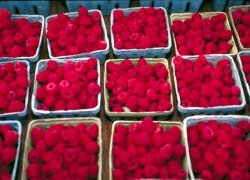 Raspberry ketone has long been used in the flavor and fragrance industry for its characteristic fruity aroma and more recently as a dietary supplement. Its scientific name is 4-(p-hydroxyphenyl)-2-butanone and it can either be extracted from raspberries or synthesized. Natural product analysis based on Carbon-14 testing is a useful tool for verifying whether raspberry ketone has been sourced from plant sources such as raspberries or is synthetic and derived from petroleum.
Raspberry ketone has long been used in the flavor and fragrance industry for its characteristic fruity aroma and more recently as a dietary supplement. Its scientific name is 4-(p-hydroxyphenyl)-2-butanone and it can either be extracted from raspberries or synthesized. Natural product analysis based on Carbon-14 testing is a useful tool for verifying whether raspberry ketone has been sourced from plant sources such as raspberries or is synthetic and derived from petroleum.
The amount found naturally in raspberries is very low, so synthetic routes are the more economical route. This incentivizes the substitution of the natural raspberry ketone with the synthetic version. Of the different synthetic routes, a common method uses 4-hydroxybenzaldehyde and acetone, both of which are cheaply produced from petrochemicals.
In the US, raspberry ketones are only approved as a food additive (21 CFR § 172.515). They are also sold as a dietary supplement. However, dietary supplements do not require U.S. Food and Drug Administration (FDA) approval.
There are stricter regulations in the European Union regarding raspberry ketones. They are approved in small amounts as a flavoring [Commission Implementing Regulation (EU) 872/2012, in compliance with EC 1334/2008]. Excluding use as flavoring, it is classified as a Novel Food (EC 258/97), and following a review in 2014 it remains unauthorized for use except for extracts prepared using water or 20% ethanol.
Natural product testing for raspberry ketone using the Carbon-14 method can differentiate between the natural extract from raspberries and the petrochemical-sourced synthetic. Given the low abundance of raspberry-sourced raspberry ketone, being able to authenticate natural source claims is important for manufacturers and suppliers.
Measuring the Carbon-14 will show the biobased content of the material. Living beings like plants have a known Carbon-14 content, whereas petroleum and its derivatives have none. Carbon-14 testing is therefore able to distinguish between biobased and petrochemical-sourced raspberry ketone.
ISO 17025-accredited Beta Analytic provides natural product testing in line with analytical standards ASTM D6866 and ISO 16620-2 8.3.2: biobased carbon content as a fraction of total organic carbon or total carbon. Results can be accessed 24/7 along with QA reports and sample photos. For prices and turnaround time inquiries, please contact Beta Analytic or call a local forwarding office.
References:
Chemical Book. n.d. p-Hydroxybenzaldehyde. Available at https://www.chemicalbook.com/ChemicalProductProperty_EN_CB6446138.htm#Production%20method (accessed July 2017).
Commission Implementing Regulation (EU) No 872/2012 of 1 October 2012 adopting the list of flavouring substances provided for by Regulation (EC) No 2232/96 of the European Parliament and of the Council, introducing it in Annex I to Regulation (EC) No 1334/2008 of the European Parliament and of the Council and repealing Commission Regulation (EC) No 1565/2000 and Commission Decision 1999/217/EC Text with EEA relevance. (2012) OJ L 267/1–161.
FEMA Flavor and Extract Manufacturers Association. n.d. 4-(p-hydroxyphenyl)-2-butanone. Available at https://www.femaflavor.org/flavor-library/4-p-hydroxyphenyl-2-butanone (accessed July 2017).
Food and Drugs. (2017) 21 C.F.R. § 172.515.
Food Standards Agency. n.d. Unauthorised novel foods, Available at https://www.food.gov.uk (accessed July 2017).
Hoelderich, W.F. and Ritzerfeld, V. (2015) Preparation of a raspberry ketone precursor in the presence of rare earth oxide catalysts. Applied Catalysis A: General 504, 654-663.
Regulation (EC) No 258/97 of the European Parliament and of the Council of 27 January 1997 concerning novel foods and novel food ingredients. (1997) OJ L 43/1–6.
U.S. Food and Drug Administration. (2017). What You Need to Know about Dietary Supplements. Available at: https://www.fda.gov/food/buy-store-serve-safe-food/what-you-need-know-about-dietary-supplements (accessed December 2017).
Upadhyay, M. (2014) Raspberry Ketones [letter] (accessed July 2017).
This entry was posted on Tuesday, July 25th, 2017 and is filed under Flavor & Fragrance, Flavors Carbon-14 Analysis, Natural Product Testing, Supplement Carbon-14 Testing .